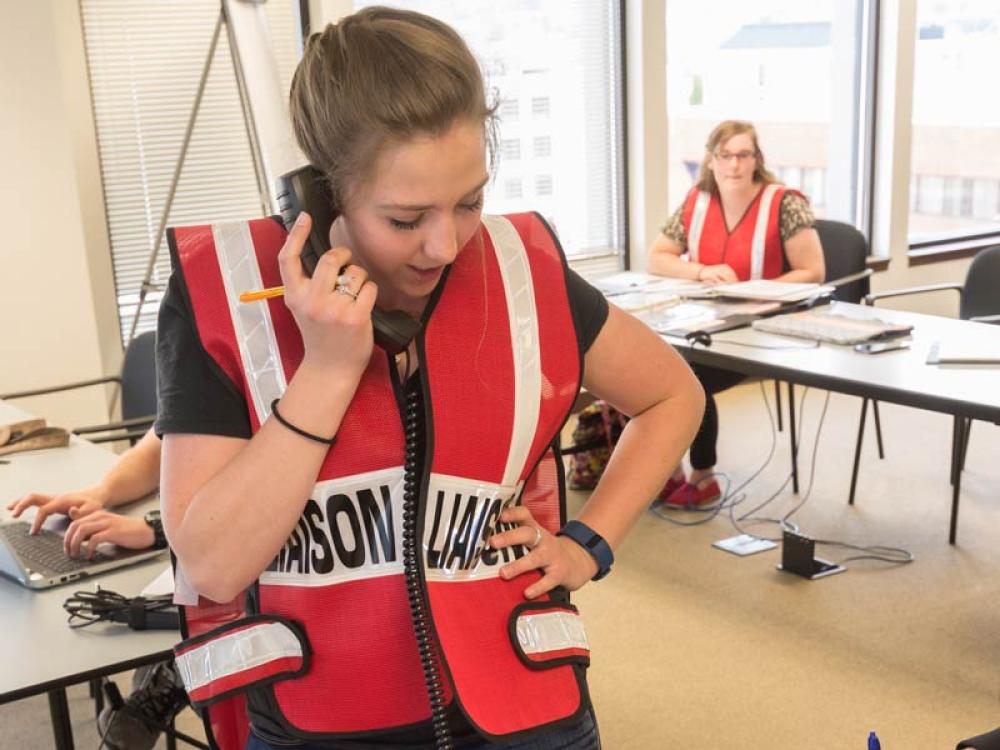Emergency Management & Homeland Security, Online
About this program
From government and healthcare to non-profit and faith-based organizations, emergency management professionals keep us safe. At Penn College, you’ll explore what it takes to serve and protect in critical times. Whether it’s developing an action plan or facilitating a coordinated response, this flexible online program cultivates the practical real-world skills that tomorrow needs most.
FEDERAL & PA GOVERNMENT EMPLOYEE DISCOUNT
Federal employees, and employees of state and regional government agencies in the Commonwealth of Pennsylvania are eligible for a 25% tuition discount.
Join the Penn College Emergency Management & Homeland Security Community ![]()
![]()

Careers
- Emergency management coordinator & specialist
- Emergency planner
- Public health preparedness worker
- Healthcare preparedness worker
- Private sector consultant
Courses
At Penn College, we believe your educational experience should go beyond specialized skills. Real-world ready means taking a broader approach that builds communication skills, inspires collaboration, and encourages exploration of arts, history, and science.
Specialization requires in-depth knowledge and high-level proficiency. Students learn and apply major-specific concepts, skills, and methods.
- Introduction to Emergency Management Operations (BEM101)
- Introduction to Sociology (SOC111)
- The History & Evolution of Emergency Management (BEM103)
- Incident Command System Operations (BEM201)
- Emergencies, Disasters & Catastrophes (BEM202)
- Disaster Preparation & Planning (BEM210)
- Crisis Communication (BEM221)
- Geospatial Information Systems in Emergency Management (BEM254)
- Disaster Recovery (BEM230)
- Directed Emergency Management Elective (BEM)
- World History I (HIS116) or
- World History II (HIS126)
- Introduction to Homeland Security (BEM340)
- Bioterrorism (BEM350)
- Criminal Justice (HSJ263)
- International Relations (PSC261)
- Trauma-Informed Care (HSJ302)
- Critical Infrastructure (BEM300)
- Terrorism, Civil War & Genocide (PSC402)
- Principles of Public Administration (PSC251)
- Technological Elements of Emergency Management (BEM311)
- Research Methods (SOC313)
- Emergency Management Internship (BEM450)
- Emergency Management Capstone (BEM495)
Perspectives are points of view, offering a variety of ways of understanding, interacting, and influencing the world. Students identify, explain, and utilize the approaches used by academics and professionals to study, analyze, or understand problems, and offer solutions.
Foundations are the practical, intellectual, and social skills: communication, collaboration, critical and ethical thinking, quantitative thinking, and technological literacy that are crucial to every student at every stage of education and at every stage of life.
- Information, Technology & Society (CSC124)
- English Composition I (ENL111)
- Mathematics Elective (MTH)
- Speech Elective (SPC)
- Business Statistics (MTH157) or
- Statistics for Health & Behavioral Sciences (MTH159) or
- Statistics for STEM Fields with Computer Applications (MTH161)
- Technical & Professional Communication (ENL201)
Next steps...
You're on your way to becoming a tomorrow maker.
Featured Videos
Internship Experiences
With 300 hours of internship experience, Emergency Management & Homeland Security students get hands-on experience in real-world settings.
Rotorfest 2023
Check out Rotorfest 2023—an action-packed day ran by emergency management & homeland security students. The event included a lineup of emergency services helicopters, drones, and vehicles.

Listen to David E. Bjorkman, instructor of emergency management/social science, as he discusses the program, career opportunities, the realistic disaster simulations in which students participate, and the overwhelming acceptance by veteran emergency managers.

Military Tuition Assistance
Thanks to the Military Tuition Assistance Program, more tomorrow makers can find their futures at Penn College. Through this special offering, qualified active military personnel are eligible to pursue college credits tuition free.
Tour Schedule
Seeing is believing.
Think Penn College might be a good fit for you? Make plans to visit and discover what hands-on learning is all about.
Industry Partners
Work with experts to become an expert
Penn College's strong corporate partnerships impact every step of your journey – from your first day in the classroom and labs, to career placement (oftentimes before graduation) and beyond.

Career Fair Connections
Penn College graduates are in high demand. Employer participation at the Career Fair is proof. Attracting 400+ organizations, this popular event is hosted twice per year and introduces students to all types of businesses from startups to Fortune 500 companies.
Online Degrees
Learning that fits your lifestyle
Convenience
- Accessible online anywhere in the world
- Flexible scheduling – take classes part-time or full-time
- Continue to work and be at home with your family
- Transfer-friendly programs shorten time to complete your degree
Value
- In-state tuition rate for all students, regardless of residency
- Same rigor as on-campus programs
Service
- One-on-one interaction with faculty
- 24/7 online tutoring
- Textbooks and course materials available for purchase online through The College Store
- Graduates can participate in Commencement
Class Delivery
- Classes delivered asynchronously through P.L.A.T.O., Penn College's Platform for Learning And Teaching Online
- No required campus visits
Related Programs
Follow your passion
Student Life
Stay active in and out of the classroom

Emergency Management Club
Our Emergency Management Club promotes, fosters, and advocates for professional development within the field of emergency management through training, conferences, and professional development opportunities within the emergency management community.

Student Organizations at Penn College
Your college experience is about more than the classroom. Join one of 65+ clubs and organizations, or create your own.
Penn College News
Tuesday, May 6, 2025
Cross-curricular collaboration explores poverty
Wednesday, April 23, 2025
Powerful giving: Making dreams come true
Wednesday, April 23, 2025
Emergency responders, students gather at third Rotorfest
Internship
Your knowledge in practice
Internships are key for career preparation. During the eighth and final semester, apply what you’ve learned in the real world working with an emergency preparedness, response, or recovery organization.

Student Experience
The community as their classroom

Silenced voices echo through survivor’s search for ‘normal’
Emergency Management Technology Online student Robyn Wolfe, a survivor of the 2017 Las Vegas shooting, recalls her experience while evaluating the reactions during and after the event.
More Information
Students must complete all BEM-designated courses with a grade of 'C' or above. Failure to achieve a grade of 'C' or above in a course after the maximum attempts allowed by college policy, results in withdrawal from the major. Students should work closely with their academic advisors and program faculty to ensure that they are meeting all criteria for satisfactory progress in the program.
Continued progression in the program, to include eligibility for internship courses and graduation, is predicated not only upon satisfactory academic performance, but also upon satisfactory demonstration of professional and ethical responsibility, personal responsibility, and satisfactory demonstration of skills and abilities prerequisite to the ethical delivery of services in the field. For more specific information about the criteria used to evaluate students' progress, a copy of the program manual can be obtained from the School of Business, Arts & Sciences.
Internal and external transfers may carry parallel major courses into the baccalaureate when the grades are 'C' or better. Transcripts should be submitted with the application for admission and will be evaluated by Registrar staff and by academic school staff. By its nature, prior work experience in emergency services, military, and other appropriate work backgrounds will be evaluated for transfer evaluation and placement in the major. The academic school dean and full-time faculty will evaluate credit for life experience for course work from applicants with non-credit training or work experience. Credits awarded for work/life experience will be posted to the applicant’s College transcript after successful completion of at least 12 credits at the College.
Alternative Credit refers to academic credits earned through means other than traditional college course completion, including: credit by exam, articulation, proof of competency gained in high school, work/life experience, and advanced placement.
Visit the Alternative Credit Options page in our Course Catalog for general requirements and procedures and for information on credit through Advanced Placement.
International students who are studying in the United States on an F-1 visa must be enrolled in a full course of study in-person. Students are not permitted to enroll in an entirely online degree. Online degrees are available to international students pursuing the degree from their home country. Students must still meet all admissions criteria for admission to the college and any special admissions requirements that govern pursuit of their chosen major.
- Mr. Benton J Best, County Emergency Management Coordinator, Tioga County Emergency Management Agency
- Ms. Roseann B Cordelli, MPA, Communications Program Manager, Tetra Tech EMI
- Mr. Gaven Crosby, '17, Supervisory Program Manager, FEMA
- Mr. William E Ebersole, JD, CPA, CFE, GISF, Security Compliance/Emergency Manager, Disney Cruise Line
- Ms. Stacey Folk, '23, EMA Manager (Emergency Management Coordinator), Lycoming County Department of Public Safety
- Mr. John W Magyar II, CEM; MCAS; CHS-V, Senior Environmental Health & Safety Technician, Range Resources-Appalachia LLC
- Mr. Chris E Miller, Chief of Police, Pennsylvania College of Technology
- Mr. David Pletz, Chief of Police & Director of Campus Safety, Penn College
- Ms. Kelle B Robinson, County Emergency Management Coordinator, Lycoming County Department of Public Safety
- Mr. Anthony N Subbio, CEM, PMP, MS, Emergency Management Specialist, Tetra Tech, Inc.
- Mr. Jeff Wagner









